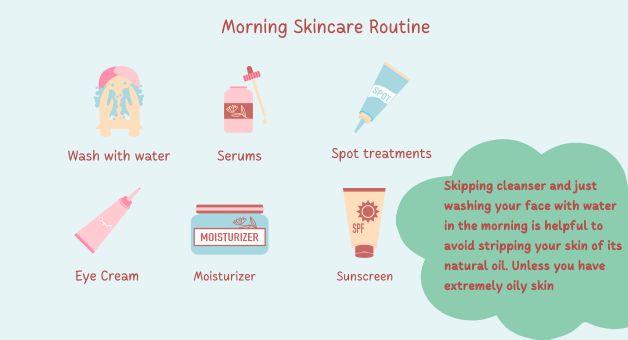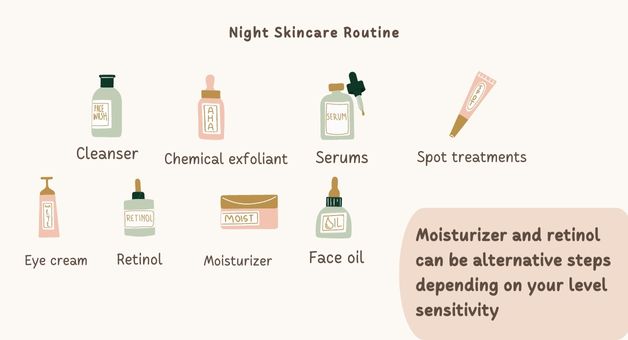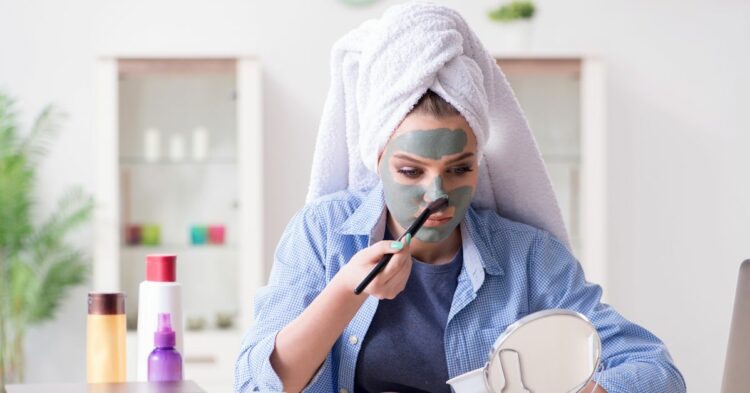Taking care of your skin is essential for maintaining its health and achieving a radiant complexion. Establishing a basic day and night skincare routine is a great way to start your journey toward beautiful and healthy skin. In this article, we will guide you through the steps of a beginner-friendly skincare routine, ensuring that your skin gets the love and care it deserves. Let’s dive in!
Identify Your Skin Typ
Before delving into any skincare routine, it’s crucial to identify your skin type. The most common skin types are oily, dry, combination, and sensitive. Understanding your skin type will help you select suitable products and tailor your routine to address specific concerns.
The Basic Skincare Routine Morning for Beginners

- Cleansing: Start your day by washing your face with a gentle cleanser to remove any impurities or excess oil accumulated overnight.
- Toning: Use a toner to restore your skin’s pH balance and minimize the appearance of pores. Opt for alcohol-free toners to avoid drying out your skin.
- Moisturizing: Apply a lightweight moisturizer to hydrate and nourish your skin. Look for moisturizers with SPF to protect your skin from harmful UV rays.
- Sunscreen: Never skip sunscreen, even on cloudy days. Apply a broad-spectrum sunscreen with at least SPF 30 to shield your skin from sun damage.
The Basic Skincare Routine Nighttime for Beginners

- Makeup Removal: Before bedtime, remove your makeup using a gentle makeup remover or cleansing oil to ensure your skin can breathe overnight.
- Cleansing: Cleanse your face thoroughly with a mild cleanser to eliminate dirt, oil, and any remaining traces of makeup.
- Exfoliation (2-3 times a week): Exfoliate your skin to remove dead skin cells and promote cell renewal. Choose a gentle exfoliator suitable for your skin type.
- Treatment: If you have specific skin concerns, like acne or hyperpigmentation, apply targeted treatments such as serums or spot treatments to address them.
- Moisturizing: Apply a nourishing night cream or moisturizer to provide your skin with the necessary hydration and support its rejuvenation process.
Additional Skincare Tips for Beginners
Here are some effective skincare tips for beginners.
a) Hydration:
Keeping your skin hydrated is essential for a healthy complexion. Drink plenty of water throughout the day to maintain your skin’s moisture levels. Aim for at least eight glasses of water daily. Additionally, you can incorporate hydrating foods such as watermelon, cucumber, and leafy greens into your diet.
b) Healthy Diet:
What you eat can significantly impact your skin’s appearance. Include a variety of fruits, vegetables, whole grains, and lean proteins in your diet. Foods rich in antioxidants, like berries and green tea, can help protect your skin from free radicals and promote a youthful glow.
c) Avoid Touching Your Face:
Throughout the day, your hands come into contact with numerous surfaces, which can harbor dirt, bacteria, and oils. Avoid touching your face to minimize the transfer of these impurities onto your skin. If necessary, wash your hands thoroughly before touching your face.
d) Quality Sleep:
Getting enough quality sleep is crucial for your overall health, including the health of your skin. During sleep, your skin repairs and rejuvenates itself. Aim for 7-8 hours of uninterrupted sleep each night to wake up with refreshed and revitalized skin.
e) Stress Management:
Chronic stress can take a toll on your skin, leading to breakouts and dullness. Find healthy ways to manage stress, such as practicing yoga, meditation, or engaging in activities you enjoy. Taking care of your mental well-being can have a positive impact on your skin’s health.
f) Sun Protection:
Besides applying sunscreen, take additional measures to protect your skin from the sun’s harmful rays. Seek shade during peak hours, wear protective clothing, such as hats and sunglasses, and use an umbrella when necessary. These steps will minimize sun damage and reduce the risk of premature aging and skin cancer.
g) Don’t Forget Your Neck and Hands:
When applying skincare products, extend them to your neck and hands. These areas are often exposed to the same environmental factors as your face and can show signs of aging. Give them the same attention and care to maintain a youthful appearance.
h) Regularly Clean Your Makeup Brushes:
Makeup brushes and sponges can accumulate bacteria, oil, and product buildup over time. Clean them regularly using a gentle cleanser or brush cleaner to prevent the transfer of impurities onto your skin. This practice will also help maintain the performance and longevity of your brushes.
i) Patch Test New Products:
Before incorporating a new skincare product into your routine, perform a patch test. Apply a small amount of the product on a discreet area of your skin, such as the inner arm, and observe for any adverse reactions. This step helps identify potential allergies or sensitivities before applying the product to your face.
j) Consult a Dermatologist:
If you have persistent or severe skin concerns, it’s advisable to consult a dermatologist. They can assess your skin, provide personalized recommendations, and prescribe specific treatments or medications if necessary. A dermatologist’s expertise can help you achieve optimal skin health.
Conclusion
By following these additional skincare tips alongside a basic day and night routine, you can enhance the effectiveness of your skincare regimen and promote the overall health and vitality of your skin. Remember, consistency, patience, and self-care are key to achieving and maintaining healthy, radiant skin.
Frequently Asked Questions!!
1. What is a basic skincare routine for a beginner?
A basic skincare routine for a beginner typically includes cleansing, moisturizing, and sun protection. It is essential to cleanse your face twice a day, moisturize to keep your skin hydrated, and use sunscreen daily to protect against harmful UV rays.
2. How often should I cleanse my face?
It is recommended to cleanse your face twice a day, once in the morning and once in the evening before bed. Cleansing in the morning helps remove any excess oil or impurities that may have accumulated overnight, while evening cleansing removes dirt, makeup, and pollutants from the day.
3. What should I look for in a cleanser?
When choosing a cleanser, look for one that suits your skin type. For dry or sensitive skin, opt for a gentle, hydrating cleanser. If you have oily or acne-prone skin, consider a foaming or gel-based cleanser that helps control excess oil.
4. Do I need to use a moisturizer if I have oily skin?
Yes, even if you have oily skin, it’s important to use a moisturizer. Look for oil-free or lightweight moisturizers that won’t clog your pores. Moisturizing helps balance the skin’s hydration levels, preventing it from producing excess oil.
5. How often should I exfoliate?
Exfoliation helps remove dead skin cells and promotes cell turnover, revealing smoother and brighter skin. However, it’s important not to overdo it. For most skin types, exfoliating 1-2 times a week is sufficient. Be gentle while exfoliating to avoid irritating your skin.
6. Can I skip sunscreen on cloudy days?
No, it’s crucial to wear sunscreen even on cloudy days. Clouds do not completely block UV rays, and they can still penetrate through and cause damage to your skin. Make it a habit to apply sunscreen with at least SPF 30 every day, regardless of the weather conditions.
“Please note that while these answers provide general skincare advice, it’s always a good idea to consult a dermatologist or skincare professional for personalized recommendations based on your specific skin type and concerns.”


